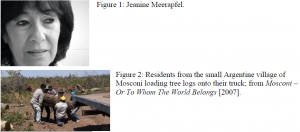Jonathan Smith and Dr. Daryl Lee, French and Italian
Jeanine Meerapfel has been a professional filmmaker for 30 years and is an important, though often overlooked, voice in German and Argentine cinema. Meerapfel, born in Argentina to German-Jewish parents who fled Germany during World War II, has worked in Germany, Argentina, and Greece, and has directed both fiction and documentary films. Since her first feature film, Malou [1981], she has tackled issues of immigration, identity and how one reconciles the past, with each subsequent film adding to the discussion of those issues. Jeanine Meerapfel’s work is fascinatingly complex and often defies rudimentary forms of categorization, proving far more complicated and multi-faceted.
I first met Jeanine Meerapfel and saw her films in Berlin at the Filmhaus program which was spotlighting the box set DVD release of nine of her films. The films so intrigued me that I wanted to do an interview with her to discuss her work. When I emailed her and asked if an interview were possible she quickly agreed. It was in early November 2009 that I returned to Berlin to sit down with Meerapfel and talk about her films.
Having never done an interview before, it was important not only to do as much research on Meerapfel and German cinema as possible, but to also learn how to conduct an interview. I worked with my mentor, Professor Lee, on compiling questions that would produce an interview that would be useful in helping an American audience better understand this German and Argentine filmmaker. After having compiled and translated my questions, I flew to Berlin and there visited the film archive to find any materials there that could be useful to the interview. The archive librarians were incredibly helpful in getting me a whole assortment of documents on her work. They were a tremendous help.
During the interview I asked Meerapfel about the political aspects of her films. She resisted referring to them as political films. Meerapfel, although believing all films to be political, does not see herself as making films to drive people to political action – “I’m not a missionary,” she stated. Her goal is to present stories and subjects that she finds interesting and allow people to discuss the topics addressed. We spoke more at length about her Argentine documentaries, Descembarcos – When Memory Speaks and Mosconi – Or To Whom The World Belongs, and the goals behind these two works. Descembarcos shows college film students trying to make short films about the military dictatorship of the late 70s and the emotion of fear. Mosconi focuses on the small village of Mosconi and how its residents were completely impoverished by the privatization of the oil companies. With both of these films a strong political message can be seen, but still Meerapfel does not see herself as a resistance fighter or as having made films to motivate people to political action, though she has no problem with people using her films for such purposes; both of these films have been so used, with the citizens of Mosconi showing her film to schools in the region and the Mothers of the Plaza de Mayo showing Descembarcos during demonstrations in Buenos Aires. An important aspect of both works is how they show every day, normal people working with extraordinary creativity and resilience to overcome the obstacles before them. The Mosconi citizens show their skill to find work and make money while working tirelessly to protest to privatization of the oil firms. The students of Descembarcos show a sincere desire to express feelings from the heart about an issue of immediate importance to Argentine history, despite many people opposing their attempts to investigate and preserve that history. Meerapfel is a believer in the strength of the common person to accomplish great things, though these stories aren’t that simple either.
Meerapfel’s films show situations that are complex and without easy solutions and answers, and she avoids giving solid answers to the problems presented, instead leaving the film open so the viewer is able to insert their own thoughts and/or conclusions. “I like films that give me room,” she said. She doesn’t want to push the viewer too far to feel or think a certain way, instead she tries to maintain a cinematic form that allows the viewer to see difficult situations, but without forcing them to feel a certain emotion or to hold a specific opinion about what has happened.
She has recently finished another fiction script and also mentioned her great fascination with Westerns, a genre that she has yet to tackle, though she hopes to someday make a Western. Other more recent films that have influenced or inspired her are Fargo, Magnolia, and There Will Be Blood. She readily admits she is making very different films than these influences, but that she always finds inspiration from works quite different from her own.
The almost two hour interview with Jeanine Meerapfel took place at her home and I recorded it with a digital recorder. I am currently transcribing the interview, with assistance from volunteers in the German department, to be submitted for publication in a journal, or in BYU’s German department’s online resource, the Sophie Project. I have also been accepted to present a paper at the UCUR conference at Southern Utah University in February 2010 on this project. This interview will also help me complete my German major capstone paper, which I will complete by April 2010.

Many thanks to Professor Daryl Lee for mentoring this project. Further thanks go to Professors Laura Catherine Smith, Rob McFarland, and Michelle James of the German & Slavic Language Department, and Dean Duncan of Theater and Media Arts for their generous help. Thanks also go to those who have volunteered their time to help transcribe the interview.
